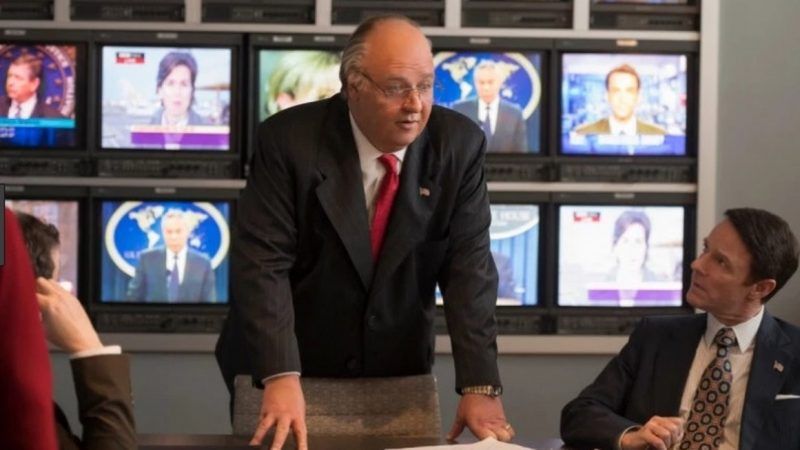The Loudest Voice Turns Roger Ailes into a Cartoon
There was a lot more to the Fox News boss than just vicious villainy.

The Loudest Voice. Showtime. Sunday, June 30, 10 p.m.
Fox News boss Roger Ailes was once reminiscing about his early show-biz career as a producer on the old talk-variety Mike Douglas Show, which, he said required more delicacy than you might imagine. For instance, one afternoon the show's bookers had scheduled onto the same show Richard Nixon and an exotic dancer who worked with a boa constrictor. Ailes had to hunt up separate green rooms for each. "I didn't want to scare Nixon," he said, "or the snake."
That Ailes—irreverent, funny and charming—does not appear in the Showtime miniseries The Loudest Voice, an account of his rise and fall at Fox News. The Loudest Voice's Ailes is a conniving, lying, backstabbing, and relentlessly priapic son of a bitch. It is impossible to believe anybody ever worked with him for longer than 10 minutes, and it is even more impossible to believe that any Showtime viewers are going to spend seven hours watching him.
The show is based on the 2014 book The Loudest Voice in the Room: How the Brilliant, Bombastic Roger Ailes Built Fox News—and Divided a Country, which the New York Times called "disingenuous" and suggested "may set a record for blind items and the untrustworthiness they engender."
To be fair, the book did offer the very first reporting on Ailes' profligate sexual misbehavior. And the stories that author Gabriel Sherman wrote for New York magazine two years later as Ailes' Fox News empire crumbled under a tidal wave of sexual harassment suits were better sourced and almost entirely verified by events.
But the Ailes conjured in Sherman's book and in Showtime's series (played with fiendish delight by a bellowing, blustering Russell Crowe with the same zeal with which he throws telephones at errant hotel concierges) is utterly one-dimensional, like something Nancy Pelosi might have dreamed after a triple-anchovy pizza.
If he's not feeling up a job applicant, he's placing secret phone calls from phone booths to Dick Cheney to cook up a disinformational recipe for war in Iraq. Or he's whispering malign sweet-talk in the ear of a job candidate: "You're a trained killer. You're an assassin. And I know that for a fact because I'm the guy who trained you." And news, schmooz, it's just TV. "It's all the same—news, talk shows, English fucking bulldogs, it's all the same," Ailes declares to a senior producer.
Some of this is unquestionably true. Ailes, if he wasn't quite as flippant about journalism as Crowe's character, certainly believed TV news had to be entertaining, and hired a cast of brassy tabloid personalities like Geraldo Rivera, Bill O'Reilly, and Shep Smith to punch his network up. (None of these men appear in the first three hours of The Loudest Voice, and the queen of the Fox News attack blondes, Megyn Kelly, apparently isn't in the show at all.)
And the rank sexual side of Ailes' personality is fairly portrayed, too. Some of the targets of his aggressive advances—notably including Fox New daytime host Gretchen Carlson—covertly taped them, and Fox News at last word had paid out $45 million to settle their suits.
The political elements of The Loudest Voice, though, are much more thinly documented if at all. If there's any evidence of Ailes creeping around New York alleys to plot genocide with Cheney, I haven't seen it. The war in Iraq was not brought about by Fox News but by a delusional U.S. intelligence community that declared the presence of weapons of mass destruction in Baghdad a "slam dunk."
More fundamentally, though, Roger Ailes was simply a more interesting man than the one you see on screen in The Loudest Voice. He brought ideological diversity to television news. (If you think it wasn't politicized before Fox News came along, you must never have seen Dan Rather.) Yes, he put Sean Hannity on TV, but also Charles Krauthammer.
He practically invented the job of political image consulting as part of the Nixon campaign in 1968, and he wrote one of the great campaign wisecracks of all time when he got 73-year-old Ronald Reagan to promise, at the beginning of a 1984 presidential debate with 56-year-old Walter Mondale, that "I am not going to exploit, for political purposes, my opponent's youth and inexperience." Reagan and Nixon were his friends, but so were Barbara Walters and Susan Estrich. View Ailes' life as an exercise in personal and political villainy, if you will; but it's a fascinating one. The Loudest Voice is merely repellent.


Show Comments (21)